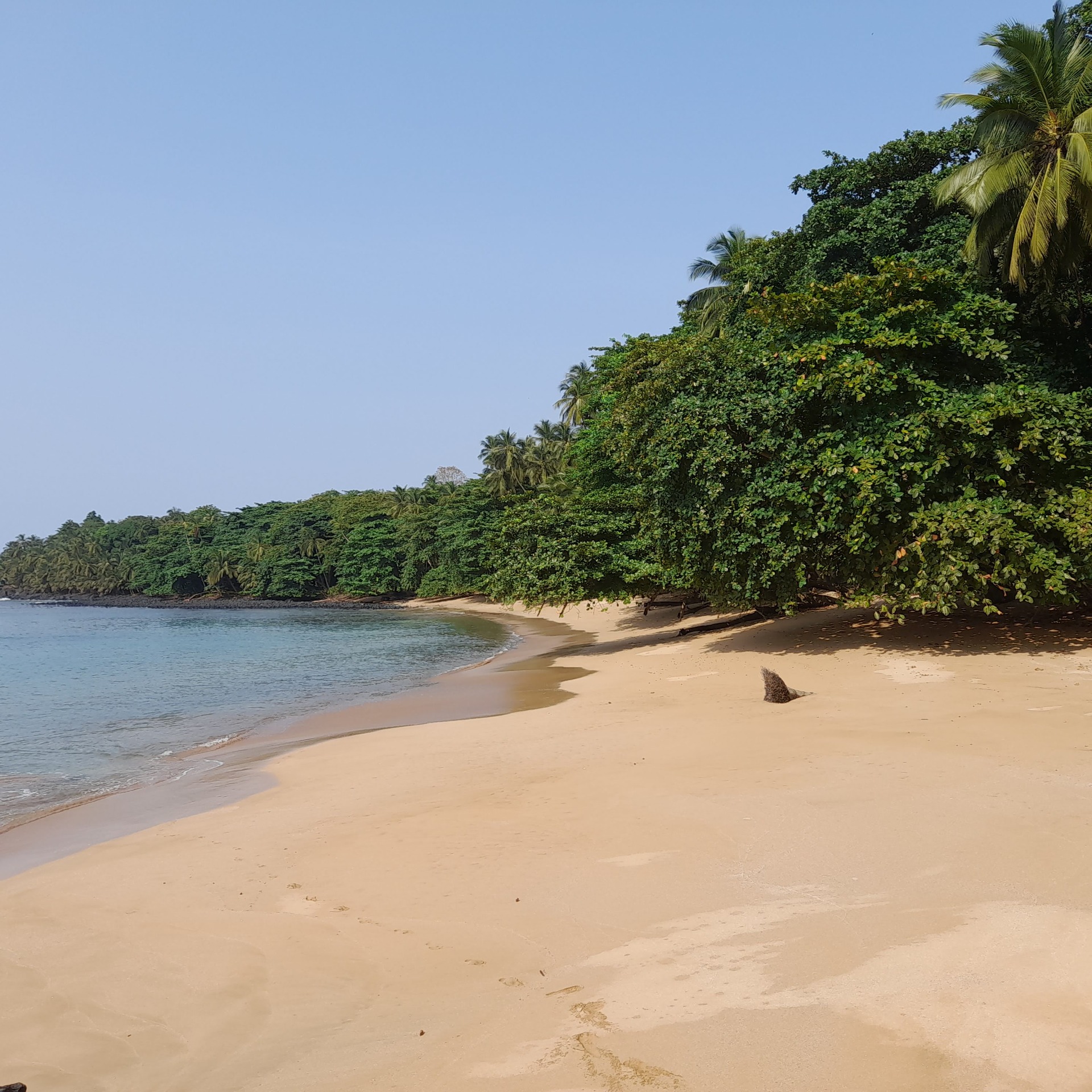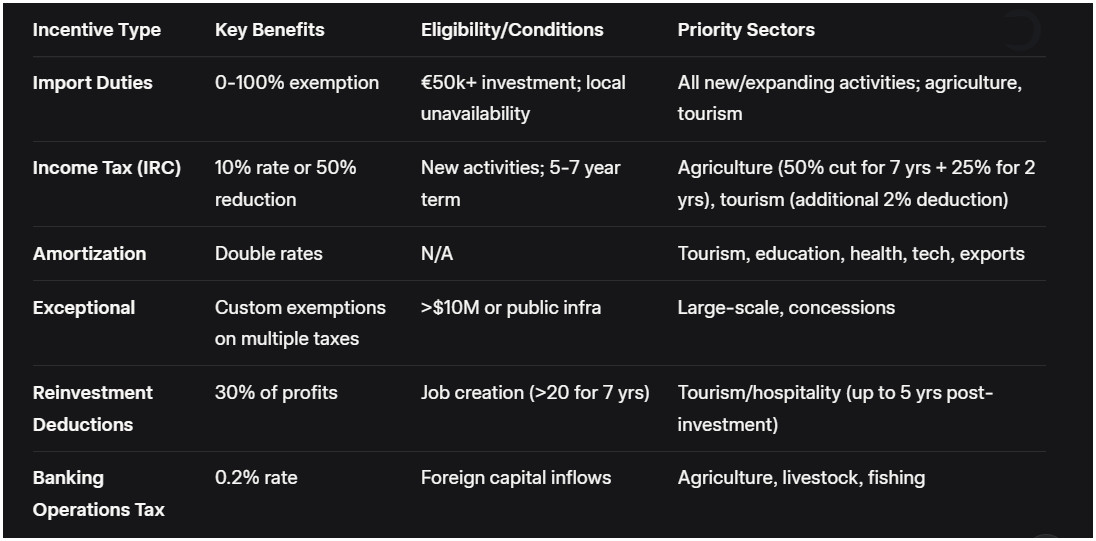
Investment Incentives in São Tomé and Príncipe
Investment Incentives in São Tomé and Príncipe
The provided "Investidor Guide" excerpt outlines key tax and benefit incentives under São Tomé and Príncipe's (STP) Investment Code (Decree-Law No. 19/2016), aimed at attracting foreign direct investment (FDI) by reducing costs for new or expanding businesses. These incentives focus on import duties, income taxes, accelerated amortization, and exceptional benefits for large-scale projects. They align with STP's strategy to diversify its economy beyond cocoa exports and tourism, leveraging its strategic Gulf of Guinea location. Below, I analyze the provided information, cross-referencing it with broader context from official sources, and provide background knowledge on STP's investment climate as of September 19, 2025. Note that while these incentives remain active, a Temporary Law on Investment Incentives (Law 9/2023) is slated for revocation by year-end, potentially affecting how incentives are granted.
Key Incentives
The guide emphasizes incentives to lower entry barriers and operational costs, with eligibility tied to project specifics like novelty, scale, and local unavailability of goods. Here's a breakdown:
Exemption from Import Duties: Full exemption on goods and equipment for launching or expanding activities, conditional on submitting a provisional list to the General Directorate of Customs and confirming that equivalent products aren't produced locally (or don't meet quality/price/functional standards). This reduces upfront capital costs, particularly beneficial for capital-intensive sectors like infrastructure or manufacturing.
Income Tax Benefits: A reduced Corporate Income Tax (IRC) rate of 10% for investments in new activities (compared to the standard 25% rate). This applies to taxable income from resident and non-resident entities, making STP competitive for startups or diversification projects.
Accelerated Amortization and Reinstatements: Double the normal amortization rates for investments in priority sectors (tourism, education, health, new technologies, and exports). This allows faster deduction of costs from the tax base, improving cash flow and ROI over the short term (typically 5-7 years).
Exceptional Incentives:For investments exceeding USD 10 million or public infrastructure under concession, customized benefits via a Council of Ministers-approved contract. These may include exemptions or reductions in import duties, withholding tax, IRC/IRS (Personal Income Tax), Stamp Duty, Consumption Tax, and SISA (Real Estate Transfer Tax). Non-cumulative with other incentives, this targets mega-projects like ports or energy.
Eligibility often requires an Administrative Investment Agreement through the Agency for Promotion of Commerce and Investment (APCI), with minimum thresholds (e.g., €50,000 for basic benefits, scaling up to €5 million for fuller exemptions). Benefits are irrevocable during their term but non-transferable. Additional general perks include deductions on stamp taxes, taxes on banking operations, withholding taxes, and incentives for human resources training.

.
Sector-Specific Enhancements
The guide highlights priority areas, with additional perks detailed in official sources like the APCI's Investor Guide and the Fiscal Benefits Code (Decree-Law No. 15/2016). These build on the base incentives, offering targeted reductions and exemptions to boost key sectors. Here's an expanded breakdown incorporating the latest specific tax benefits:
Agriculture, Agro-Industry, Livestock, and Fishing: 50% reduction in the IRC rate for the first 7 years of activity under the Investment Code. After the initial 7 years, a 25% reduction in taxable profit for an additional 2 years. A single rate of 0.2% on the tax for banking operations related to foreign capital inflows for project implementation. Total exemption from the tax rate on income from investment of capital for credit reimbursements. Conditions: Investments must be new ventures under the Investment Code; benefits apply to activities aimed at production and diversification. Plus, full import/export duty exemptions and up to 10-year tax holidays in some cases.
Tourism and Hospitality: Investments in rehabilitation, construction, expansion, or modernization of hotel units (including complementary parts for tourism services, rural, or ecological tourism) benefit from tax advantages in the Tax Benefits Code, with an additional deduction of two percentage points (potentially reducing the effective IRC rate further from the 10% base for new activities). Deduction from the tax base equal to 30% of reinvested profits each year, up to the fifth year following the investment, provided the project creates more than 20 jobs annually for 7 years from the start of operations. Import exemptions for construction/rehabilitation materials, and up to 10-year tax holidays or reduced rates (e.g., 12% IRC in some frameworks). Conditions: Must focus on tourism production or development; job creation quota required for reinvestment deductions.
Other Priorities (e.g., Education, Health, New Technologies, Exports): Deductions up to 50% of taxable income for modern tech/equipment investments (first 5 years), plus training costs for local workers. Special development zones (e.g., districts of Cantagalo, Lemba, Lobata, Caué, and Príncipe) offer exemptions from SISA, same benefits for reinvested capital as initial investments, and recognition of proven initial expenses as tax costs for IRC determination. Conditions: Location in designated zones; investments must qualify under the Investment Code. These align with STP's push for sustainable growth, but investors should note job creation quotas (preference for locals) and environmental impact assessments.
Potential Changes in 2025
As of September 19, 2025, the incentives are intact, but the IMF-backed Extended Credit Facility (ECF) program requires revoking the Temporary Law on Investment Incentives (Law 9/2023) by end-2025.
Enacted in September 2023, this law allowed exceptional approvals without public tenders to expedite investments in areas like food production (agriculture/fishing), health, education, energy, and tech.
Revocation aims to enhance fiscal transparency, reduce corruption risks, and reinstate standard procurement, potentially slowing incentive approvals but improving governance. This won't directly alter the core Investment Code but may impact large projects.
Meanwhile, the new Citizenship by Investment (CBI) program, launched August 2025, offers indirect benefits like moderate taxes (corporate 25%, personal 0-25%, no wealth/inheritance/capital gains) for investors gaining citizenship via $90,000+ donations.

.,
Background Knowledge on STP's Investment Climate
STP, a small island nation with ~232,000 people and GDP of ~$670 million (per capita ~$2,900), relies on agriculture (cocoa ~60% of exports), tourism, and emerging oil/gas prospects. GDP growth is projected at 3.1% for 2025 (up from 2.4% in 2024), driven by tourism recovery, infrastructure, and FDI.
The 2016 Investment Code promotes 100% foreign ownership in most sectors, with APCI's One-Stop Shop (GUE) streamlining registrations (1-5 days). STP ranks moderately free economically (4th in Africa for economic freedom), with strengths in democracy (3rd in Africa), low corruption (64th globally), and high literacy (97%). Challenges include infrastructure deficits (e.g., unreliable power), climate vulnerability, and fiscal pressures (public debt ~70% of GDP). The IMF's ECF (approved Dec 2024) supports reforms, including VAT introduction (15%) and revenue mobilization. Public-Private Partnerships (Law 06/2018) aid infrastructure, positioning STP as a logistics hub


.